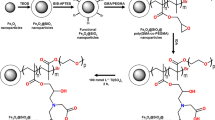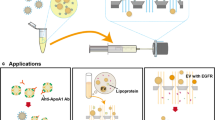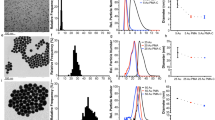Abstract
THE use of magnetic polymers as supports for biological molecules has created much interest1–5. The inherent advantages of such preparations are, in particular, the ease of recovery of these polymers by applying a magnetic field. Thus, when used as supports for immobilised enzymes, their easy retrieval from liquors containing colloids or undissolved solids should be of great practical value1–3. Magnetic polymers have recently been tested as an alternative to conventional radioimmunoassay technique, obviating the need for vertical rotation and for the time-consuming, multiple centrifugations required with conventional solid phase procedures4–5. In the established techniques for producing magnetic polymer particles, the attachment of the biomolecules had to follow the preparation of the specific magnetic material; furthermore most of these preparations have been non-porous, exhibiting rather poor capacity. We describe here a novel and general procedure using magnetic fluids which allows ‘post-magnetisation’ of polymers already substituted with biological molecules. The properties of such preparations have been tested primarily as affinity chromatography gels. These preparations showed unaltered biospecificity when applied in general ligand-affinity chromatography studies. The simplified separation possible due to the magnetic properties of the gels eliminates the usual centrifugation and column chromatography steps. The procedure of ‘post-magnetisation’ seems to be suitable for different polymer particles, both unsubstituted gels and those carrying immobilised ligands as affinity adsorbents or enzymes.
This is a preview of subscription content, access via your institution
Access options
Subscribe to this journal
Receive 51 print issues and online access
$199.00 per year
only $3.90 per issue
Buy this article
- Purchase on Springer Link
- Instant access to full article PDF
Prices may be subject to local taxes which are calculated during checkout
Similar content being viewed by others
References
Munro, P. A., Dunnill, P. & Lilly, M. D. Biotechnol. Bioengng 19, 101–124 (1977).
Horisberger, M. Biotechnol. Bioengng 18, 1647–1651 (1976).
Chaplin, M. F. & Kennedy, J. F. Carbohyd. Res. 50, 267–274 (1976).
Lynn, N. et al. Clin. chim. Acta 69, 387–396 (1976).
Hersh, L. S. & Yaverbaum, S. Clin. chim. Acta 63, 69–72 (1975).
Brodelius, P., Larsson, P. O. & Mosbach, K. Eur. J. Biochem. 47, 81–89 (1974).
Andersson, L., Jörnvall, H., Åkeson, Å. & Mosbach, K. Biochim. Biophys. Acta 364, 1–8 (1974).
Andersson, L., Jörnvall, H. & Mosbach, K. Analyt. Biochem. 69, 401–409 (1975).
Porath, J. & Axen, R. Methods Enzym. 44, 19–45 (1976).
Author information
Authors and Affiliations
Rights and permissions
About this article
Cite this article
MOSBACH, K., ANDERSSON, L. Magnetic ferrofluids for preparation of magnetic polymers and their application in affinity chromatography. Nature 270, 259–261 (1977). https://doi.org/10.1038/270259a0
Received:
Accepted:
Issue Date:
DOI: https://doi.org/10.1038/270259a0
This article is cited by
-
Hydrogen peroxide sensor based on a stainless steel electrode coated with multi-walled carbon nanotubes modified with magnetite nanoparticles
Microchimica Acta (2012)
-
Preparation of superparamagnetic β-cyclodextrin-functionalized composite nanoparticles with core–shell structures
Polymer Bulletin (2011)
-
The self-assembly, characterization and application of hemoglobin immobilized on Fe3O4@Pt core-shell nanoparticles
Microchimica Acta (2010)
-
Electrochemical synthesis of Fe3O4-PB nanoparticles with core-shell structure and its electrocatalytic reduction toward H2O2
Journal of Solid State Electrochemistry (2009)
-
Protein purification using magnetic adsorbent particles
Applied Microbiology and Biotechnology (2006)
Comments
By submitting a comment you agree to abide by our Terms and Community Guidelines. If you find something abusive or that does not comply with our terms or guidelines please flag it as inappropriate.



